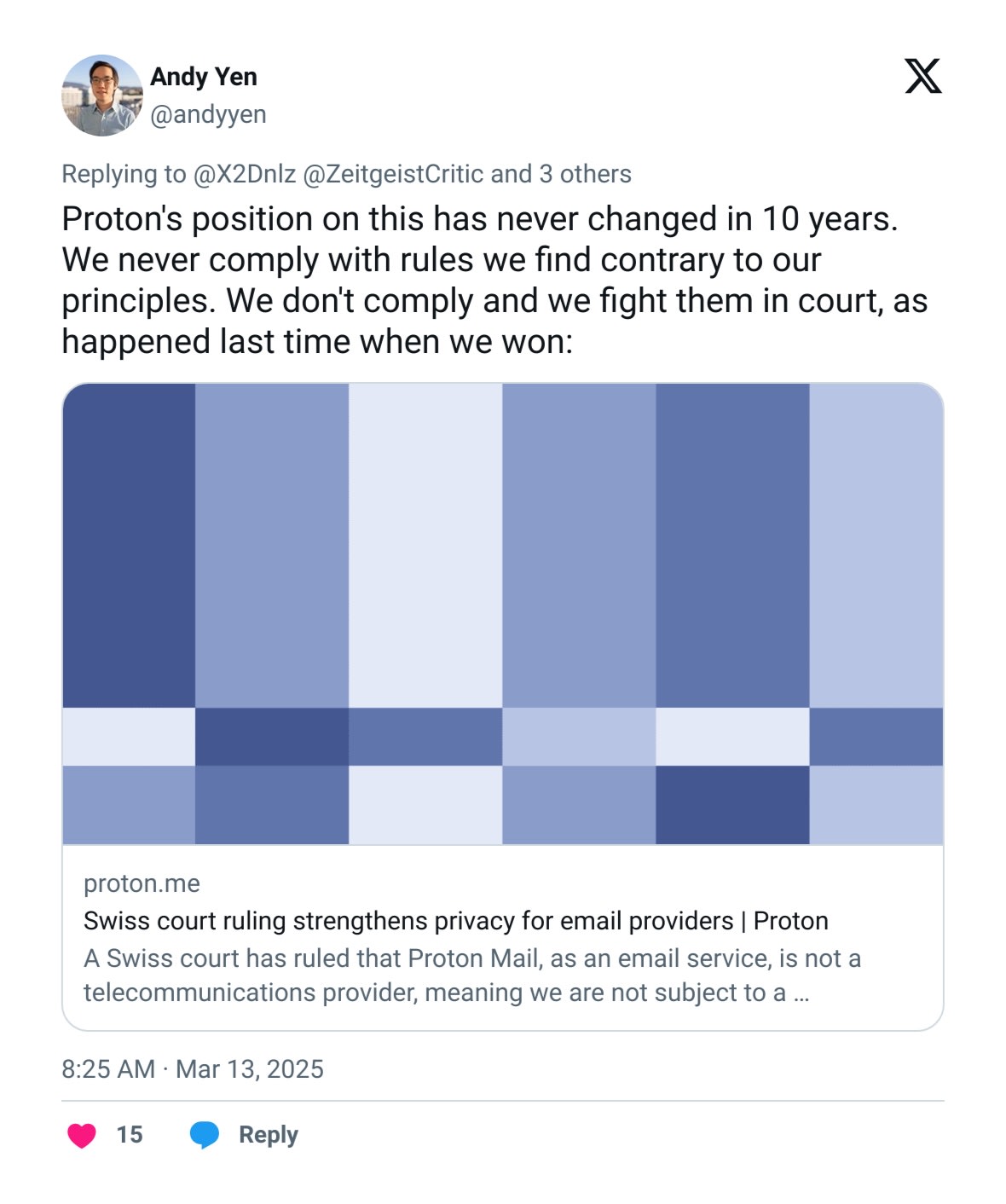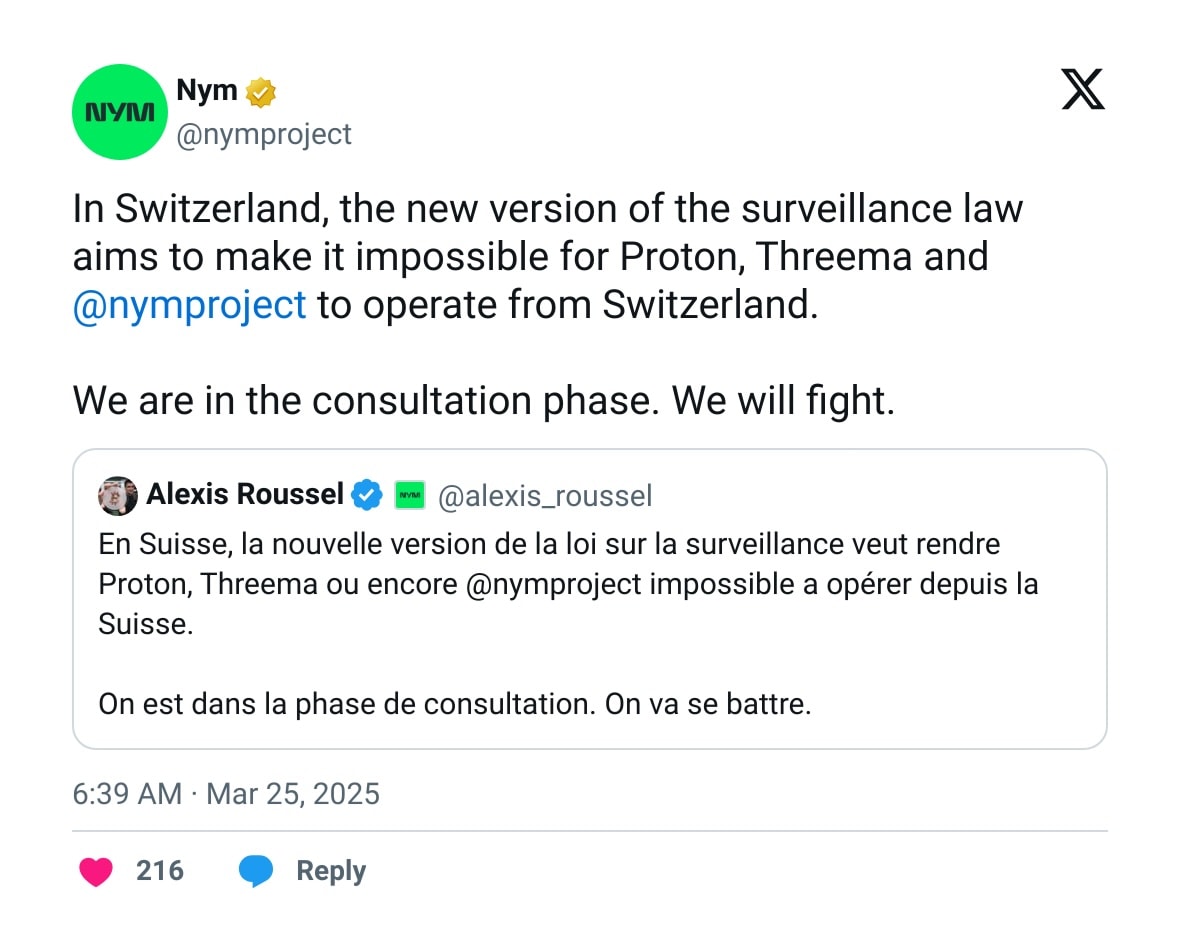Crypto Projects Gear Up for Privacy Showdown in Switzerland

For a long time, Switzerland has been regarded as a symbol of privacy, attracting businesses, organizations, and affluent individuals seeking to shield themselves from global scrutiny. Many Web3 initiatives have also chosen to settle here due to the Swiss government’s supportive attitude towards blockchain technology and digital assets.
Switzerland's image as a sanctuary for privacy has led it to become a central location for privacy initiatives setting up their roots or developmental bodies within the country, including Nym, Session, and Hopr—alongside established privacy software firms like Proton and Threema.
Currently, a suggested amendment to a Swiss surveillance regulation is causing concern among these initiatives, as it would significantly heighten the government’s demands for user monitoring. However, the distributed structure of cryptocurrencies might provide a way forward for individuals aiming to safeguard their privacy amid growing scrutiny.
Switzerland is a sanctuary for privacy — or perhaps that’s not true.
For a long time, Switzerland has been regarded by numerous people as having some of the globe’s most robust privacy safeguards. Being the entity behind the secure Proton Mail email service, Proton plays a significant role in this regard. argued In a 2014 blog entry entitled "Why Switzerland?", the Central European nation presents multiple benefits: businesses operate beyond the reach of both U.S. and E.U. jurisdictions, the country maintains political neutrality, it has robust constitutional safeguards for privacy, and it features well-established infrastructures.
Kee Jeffries, who co-founded the decentralized private messaging application Session, recently told Cointelegraph’s The Agenda podcast it was crucial to set up the base "in a nation with a substantial legacy of safeguarding individuals' personal privacy and freedom of expression."
Nevertheless, every government has to strike a balance between citizens' privacy rights and national security issues. In Switzerland, this is regulated through the Ordinance on the Surveillance of Correspondence by Post and Telecommunications (OSCPT).
In January, the Swiss Federal Council took action. proposed A modification to the OSCPT aimed at enhancing user surveillance obligations for telecom service providers and expanding the criteria for compliance to encompass services like virtual private networks (VPNs), social networking platforms, and instant messaging applications.
To put it briefly, under the current wording of these amendments, service providers serving more than 5,000 users must be able to recognize every user and willingly unencrypt any communication that isn’t protected through end-to-end encryption.
Privacy initiatives combat surveillance.
The relocation has sparked significant opposition within the privacy sector. Proton CEO Andy Yen has vowed to contest the decision through legal means and may even consider removing his firm from the nation. The decentralized VPN service Nym remains unaffected. issued a public appeal urging Swiss citizens to reach out to their representatives and rally against the measure.

In a statement, Nym’s Chief Operating Officer, Alexis Roussel, mentioned that the decree issued by the Federal Council "is ruining an entire industry," he further noted:
This regulation poses a direct threat to those who utilize these services.
Sebastian Bürgel, the vice president of technology at Gnosis and the founder of the decentralized mixnet Hopr, voiced similar worries as Yen and Roussel. He told Cointelegraph that he believes this action will probably have an adverse effect.
If the aim is to restrict the privacy and anonymity offered by services like Proton Mail, Proton VPN, and Threema, this won’t make much difference since these companies might exit Switzerland if that occurs," he stated. "However, once more, the repercussions would affect everybody out there and all those currently residing in Switzerland.
Related: Preserving crypto cypherpunk safeguards users against censorship and corporate control — says Gnosis VP
In the meantime, Ronald Kogens, a legal associate at the Swiss law firm MME with expertise in Web3 and fintech, informed Cointelegraph that it remains uncertain whether the Swiss Federal Council possesses the jurisdiction to enact such modifications.
"In an ordinance, you can't incorporate significant rights or obligations that strongly affect individuals in Switzerland," he explained, noting that the Federal Council is primarily an executive body and that such regulations must be approved by Parliament.
“A question you might pose is: Does the Federal Council have the authority under the laws that grant them the ability to issue ordinances, the power to carry out their current actions?”
Is Switzerland’s cryptocurrency sector under threat?
The action taken by the Swiss Federal Council is harming Switzerland’s reputation for privacy, yet decentralized technologies such as blockchain networks might provide some relief. As stated by Kogens, genuinely decentralized initiatives ought to be excluded from the newly imposed surveillance regulations.
In my view, most Web3 activities remain unaffected since providing purely software-based services without managing the entire infrastructure for messaging or communications systems falls outside of this scope," he explained to Cointelegraph. "It’s necessary to run particular servers or clients that form a crucial component of these communication or messaging services."
In either case, the greater the decentralization of a project, the lesser the ability any government has to control its activities. For instance, consider Tornado Cash, which has been operating steadily for many years regardless. multiple developers being arrested and the US sanctioning its smart contracts at one point.
Nym CEO Harry Halpin told Cointelegraph in March That "theoretically, we could be hit by a car, and the network would continue to function."
“As an instance of Web3 infrastructure, Hopr doesn’t run the underlying infrastructure, correct?” asked Bürgel. “The Hopr Association focuses on software development and R&D, but we do not act as operators of the network.”
Since the Hopr network is entirely decentralized and anonymous, the Hopr Association would be unable to provide user data to Switzerland, regardless of legal requirements.
The individual node operators involved in this, along with other third parties, cannot determine who is utilizing the Hopr network to reach various web services. This anonymity is precisely what we aim to achieve.
The future prospects for privacy in Switzerland
The Swiss Federal Council has suggested modifications to the OSCPT that are currently under consultation. The public is invited to provide their input on these proposals until May 6th.
Kogens informed Cointelegraph that the council will examine the feedback, prepare a final report, and determine whether to modify the proposal. "This occurs frequently," he noted, "since ultimately, it isn’t beneficial for Switzerland to implement measures that could harm the industry, provided they can still achieve their objective through this surveillance legislation."

But even if the changes go through as written, there could be some positive knock-on effects for the crypto space. “It may be that the silver lining is that it will drive users to decentralized and privacy-facilitating solutions instead,” said Bürgel.
It’s obvious to everybody that increased monitoring is detrimental," he remarked. "Each person clearly grasps this.
Controlling the surveillance apparatus is an objective of Web3. It goes beyond virtual currency. Indeed, I believe we require additional individuals striving for this.
Magazine: The UK’s dystopian AI assassination prediction system, AI will potentially replace your occupation.
Document has no content
0 Response to "Crypto Projects Gear Up for Privacy Showdown in Switzerland"
Post a Comment